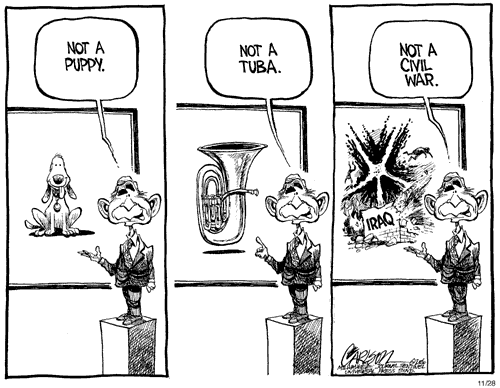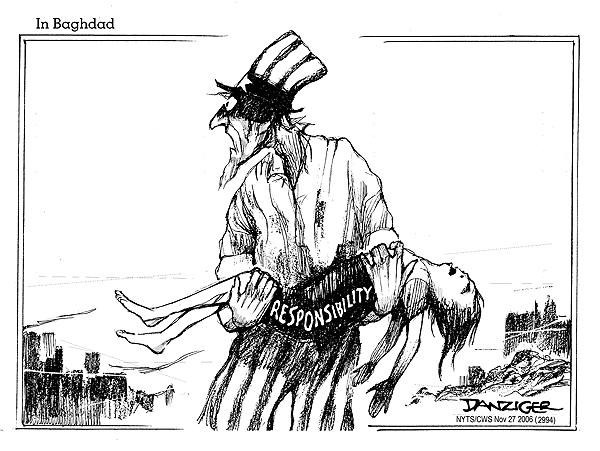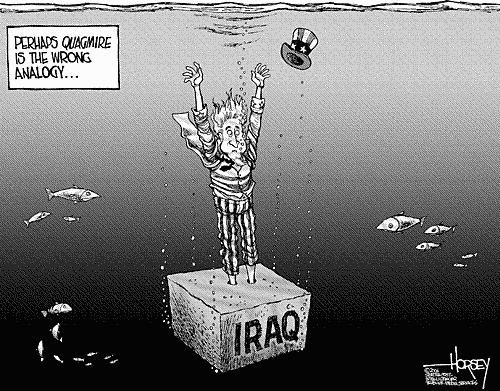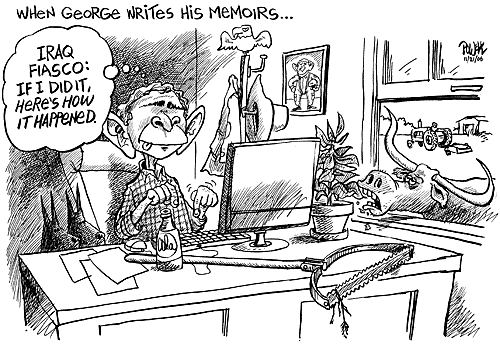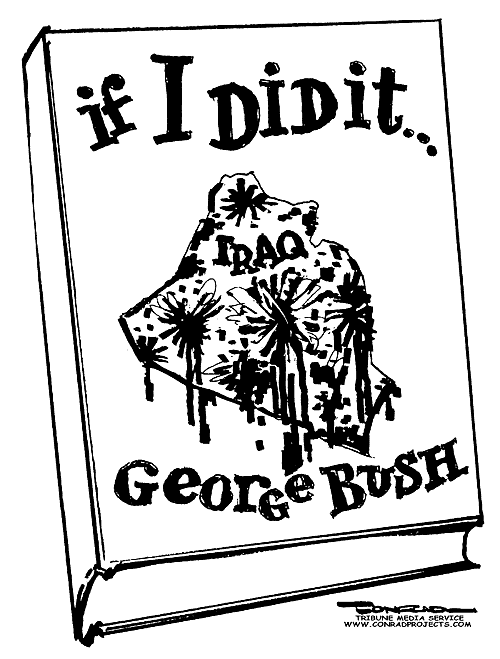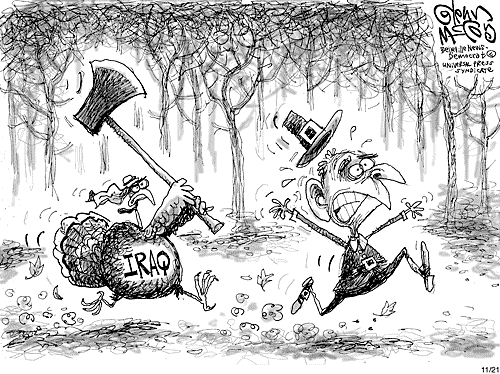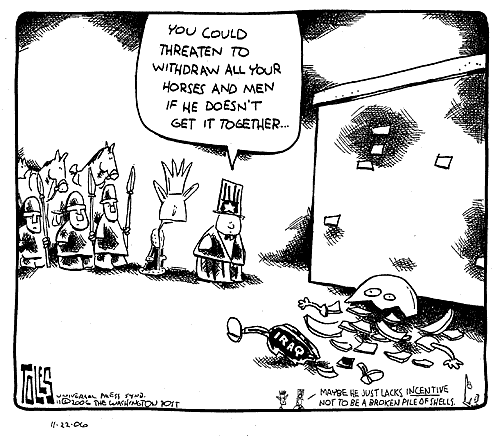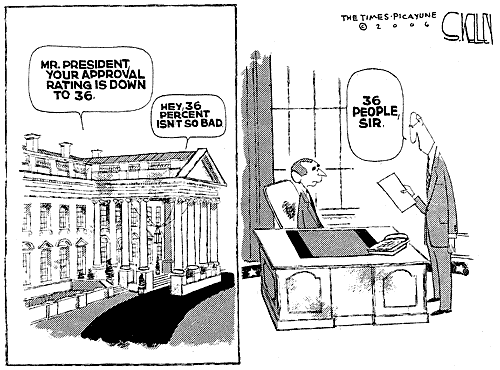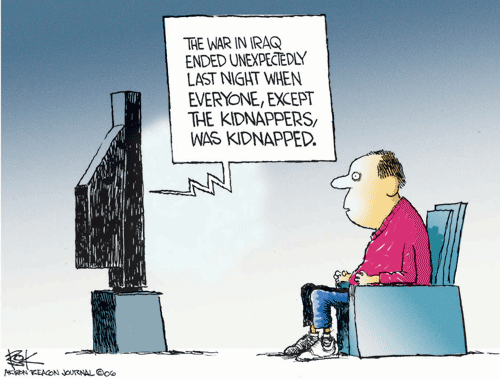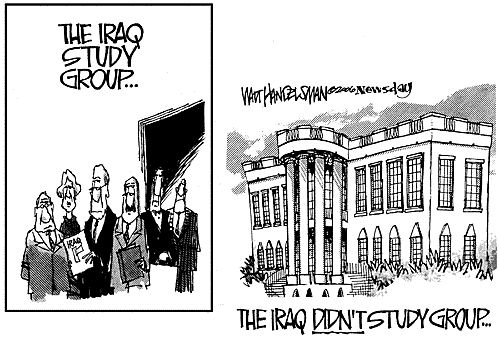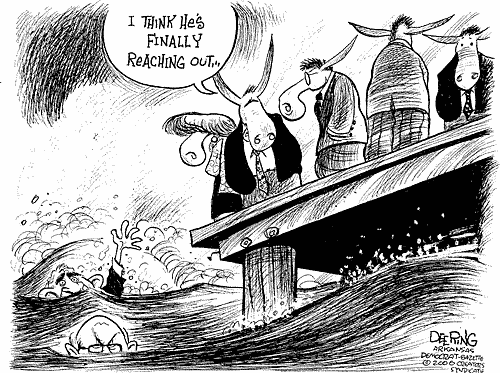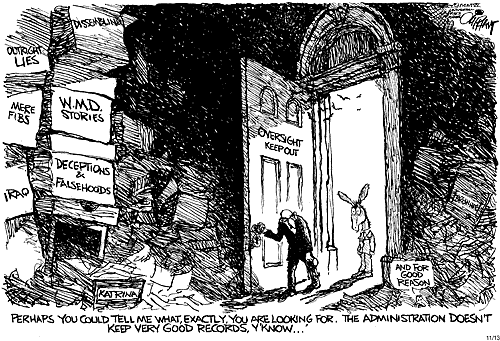The contributors on this page are Iraqi writers and English translators, two of whom worked for the American military. Because of their work, they were hunted by death squads and only escaped Iraq with assistance from PEN and the Norwegian government. Larry Siems, director of the Freedom to Write Program at PEN American Center, interviewed them in Norway, where they have political asylum. These essays are adapted from his interviews.
----------
November 20, 2006
Fear of Freedom
By WADDAH ALI
UNDER Saddam Hussein, if you were not a member of the Baath party, you wouldn't get rations, you'd be forbidden to carry on studying, you wouldn't be on the earth but in the sea.
I was invited to join the party in 1976, when I was doing my compulsory military service after earning my first degree at Mosul University. The colonel in control of my camp wanted to sit for an examination, and he asked me to join the party and translate the Oxford Companion to Military History into Arabic for him.
I'm very ambitious. I wanted to carry on with my studies. And so I joined the party, and when I finished my military service I was appointed to the university. They never appoint anyone unless you're a party member, it doesn't matter if you're Plato or Aristotle.
In 1982, when Iraq and Iran were at war, they asked me if I wanted a promotion within the party. To get this, I would have to go with some other comrades and execute deserters from the war. I told them I was not an executioner.
They put me in prison. Through family contacts, I got out after one month. They expelled me from teaching and transferred me to clerical work.
I tried to escape Iraq for Turkey in 1995. But the Kurds in northern Iraq demanded money I didn't have, and I decided to go back to Mosul, where I had a 300-meter plot of land given to me by Saddam Hussein.
Saddam Hussein gave everybody a plot of land. He was the most generous president, but also the most severe. He was a god, and gods are arbitrary.
In Mosul, men in a black Cadillac stopped me, blindfolded me and drove me to Baghdad, to Hakmiya Prison. After three months of solitary confinement, torture and electric shocks, I was accused of spying for Turkey. When I went in, my weight was 242 pounds. I came out only 121 pounds. I was divided in half by the torture.
After a year in prison, I came home. We were impoverished. My wife and children were living with her father in Karbala -- they are Shiites -- and my salary wasn't even enough for transportation to visit them. After a long time, I was reappointed to a university near there. I had been there for three months when the Americans came.
Nobody in Karbala dared to work as a translator for the American soldiers, so I was pushed into the first ranks, translating between the military commanders and the governor every day on TV. I found myself riding a rocket of fame and prestige, but no money. Just $20 a week, and a stigma in the eyes of others.
I translated conferences and debates with the Karbala city council. I even translated for L. Paul Bremer, the American viceroy, when he came. Before he arrived, the colonel I worked for told me, ''Waddah, don't tell anybody he's coming.'' They trusted me, and I was worthy of their trust.
I tried to solve problems. Once, when students had a sit-in demonstration against the Americans, I told them: ''Be quiet, be careful in your way of dealing with them. If you're impolite, suppose they are impolite, too -- you could be killed.''
Many times when I went to my father-in-law's house I was shot at from afar. Among the Shiites there are many hard-liners who support Iran and hate America. They didn't know that by marriage, I'm a Shiite like them. They said, this guy's a Sunni, serving the Americans.
The Americans gave me a pistol to defend myself. It was a war spoil, an Iraqi intelligence-style pistol. But it created some troubles between me and the American in charge of intelligence. One day he told me, ''Waddah, give me the card for the weapon,'' the identity card allowing me to carry the weapon. I told him I didn't have it. I didn't trust him very much. He was young, proud and haughty. He frisked me, searching for the card, right in front of the president of the university, and he found the card in my pocket. He said, ''You lied to me?''
I decided to quit working for the Americans. Not long after this, a child relative of mine was kidnapped on her way home from school. I sold my wife's gold, and I sold the plot of land Saddam Hussein gave me, for the ransom. Every one of my friends was looking for her. Finally the kidnappers telephoned my brother, he gave them $50,000, and she was released. This is what the insurgents do to finance their terror.
HISTORY is an idea to you; to us it is our life. I'm a typical Iraqi. I love my country. I love my food, my way of life, I love the carpets, the mud of the Euphrates, Iraqi poetry, everything: this is my culture. If I feel proud, I recite my poets, and the rhythm comes back, and no other rhythm can supersede or remove it.
What made Saddam Hussein powerful? Information. Whenever a person checked into a hotel, a paper with his full name and a copy of his passport was given to the security quarters. Iraq was a castle; a bird could not go in without being checked. If you caused offense, you could be put in prison for good. If you were lucky you would be tried one day; if not, then we have a word in Arabic that means you rot, as food rots.
America did well to liberate Iraq. But Iraqis were used to tyranny and afraid of freedom. The Americans entered Iraq without a psychological program for dealing with this fact. Iraqis had been programmed according to another system of thought and feeling. America should have considered that.
Waddah Ali is a poet, translator and university lecturer.
----------
Lost After Translation
By BASIM MARDAN
Published: November 20, 2006
THE United States Marines entered Mosul from the north. I lived in the northern suburbs, so I saw the first American flag. When the Humvees stopped, I shook hands with the marines, and I told them: ''You are mostly welcome here. Why don't you come to my house and drink some cold water?'' They offered me a job.
I was the first or second translator to work with the coalition forces in my city, the first or second Iraqi to set foot on the American base in Mosul. The Marines paid me $150 a month, which was better than the $2 I was making as a librarian. So I didn't see weapons in their hands, I saw flowers, and I took them all as friends. I loved what I was doing because I thought it was a good thing for my country.
My family was nervous. They told me things would change. I needed the American money to get married, but my fiancée said, ''We don't need to get married now -- just quit.'' But I wanted to work with the military forever; I loved it.
The unit I worked with was training and equipping the Iraqi police, teaching them about human rights. I translated textbooks from an American police academy into Arabic. The Americans taught Iraqi officials to exercise their authority without taking bribes or humiliating employees.
Iraqis needed this education, and the unit I worked with was awesome. At one point, they did two or three patrols to clean up garbage from the streets. In our culture, cleaning garbage is a low-level job, but when we saw a captain and a general doing it, that gave us a very great feeling. I threw away my helmet, took a shovel and started working, cleaning up garbage.
But even as we cleaned the city of garbage, we forgot another kind of garbage that was accumulating. The way the Army reacted to the insurgency was not perfect. The Americans did many foolish things. When I saw the pictures from Abu Ghraib, I thought, we are teaching Iraqi policemen not to do that -- do the Americans really do that?
I grew sad, and I didn't know what to believe, because the people I worked with were great. I'd told the officers at our camp's detention center, ''You are treating those prisoners better than their own mothers.'' It's not normal in our culture for a policeman to come and feed a sick prisoner who is so dangerous that you have to keep him chained.
But I did it myself. I was very kind to Iraqi people, to my own people, and I think Americans taught me that -- the American Army that I was working with, not the American Army that was in Abu Ghraib.
In the second year, when we were processing the release of prisoners from Abu Ghraib, I read out a list of names of prisoners who needed to collect their documents. One of them said to me, ''You are all going to be killed.'' I thought he was referring to the Americans, until he said, ''No, I mean you.''
I didn't translate this for the soldiers who were with me. I was thinking, ''This person just got out of prison, and I don't want to be the reason that he goes back to prison.''
About a month later, a message was fixed to my door, full of verses from the Koran and threats and curses. They gave me about one week to quit what I was doing.
A week later, a CD was fixed on my door, picturing one of my best friends, Nabi Abul-Ahad. It was a video of them beheading him, with the message that I would be next.
I was kicked out of the house. My family didn't want me there any more. They said, ''You're going to get us all killed.'' I had to leave my wife, who was pregnant. Baghdad was a real hell, so I hid in Najjaf.
After my wife gave birth to our son, her father told her, ''If your husband doesn't come to Mosul now, even if he's going to get killed, then you are not his wife anymore.'' This can happen in our society. I didn't want to lose my wife or my son, so I went back to Mosul.
In Mosul, I had to stay hidden. I walked for about three hours in the dark, after curfew, when anybody can shoot at you, including the Americans, just to see my wife and my newborn son. Then I went back to my family's house and hid for three months.
The American Army, or whoever's in charge, has badly disappointed the translators. When I told them I was under threat, they said I could come and live on the base. I told them I had just been married, and my wife was pregnant, and my family needed me. They said I could live on the base and they would drop me by my house to visit my family at night.
Imagine if somebody saw me dropped by an American convoy near my house. The house would be burning the second I was inside. These were not logical solutions.
They could have helped my family move to Kurdistan, helped find me a job with the government there. Or, if I'd escaped to Jordan, they could tell the American Embassy there: ''This is a translator who has been working for the United States Army. He's just like an American soldier. Treat him well.''
But I'm not going to be ungrateful to the people who were fighting and dying for my country. I have friends in the American Army who died in front of my eyes.
I remember one of them, a dear friend to me who died stopping a car bomb. He was a hero. He was guarding the police academy in Mosul, which was full of new recruits being trained by the Americans.
My heart broke when I saw this: an American, coming from another continent, who died to protect Iraqi policemen. This was a good message, and I would never say that those people exploited me or exploited my thinking.
The system did. Not them.
Basim Mardan is a poet and translator.
------------
November 20, 2006
Republic of Dreams
By OMAR GHANIM FATHI
WHEN I was a student, we read many books about Western culture, democracy and the Greek philosophers. We saw movies set in America, where people were able to speak their minds, and we figured that democracy would be the salvation for us and our country.
Our dreams were romantic and rosy. The bitterness and ugliness of the reality we have faced since was nothing we could have imagined.
In Saddam Hussein's time, in order to be accepted you had to tell the government that you were a Baathist; you had to tell people in your social environment that you were religious; and in fact you had to be somewhere in the middle.
I was a moderate liberal. In my imaginary republic, there was space for everybody -- Baathists, socialists, liberals -- as long as you didn't hurt people or persecute them or impose your style of thinking or living on others.
When the Americans invaded, I was ready to shake hands with the devil himself to remove Saddam Hussein from power. I didn't think the Americans would be able to give us liberty or democracy, but I thought they would give us the space to build that imaginary republic. I didn't go to work for the Americans, but I published articles in a newspaper they established in Mosul. It was called New Hope. It told the people what the American forces were doing day by day in Mosul, and there was space where Iraqis could write opinions.
I wrote nine articles for that newspaper. One of them won a competition for the best essay on democracy and liberty in Iraq. It was a big competition, and I won. What I said, simply, was that liberty is just like your own spirit, your own soul: nobody can give it to you, but anybody can take it away from you. My photo appeared in the paper with the article.
I was a lecturer at an institute, and I started receiving threats from my students -- directly, face to face: ''You deserve to die.'' And my boss said, ''You've been a traitor to your religion and your country.'' Insurgents slid threatening letters under my door. My mother was terrified. I'm her only son.
The terrorists do not necessarily attack you personally. They attack sisters, kidnap sons, mothers. We are in a war against dishonorable enemies. The only thing that I had, the only weapon to defend myself, was my pen and my words, but the solution for them was not discussion, not disagreeing with me, but shooting me.
They shot dead a salesman who came to our door, because they mistook him for me. We sold the house and went to live with my sister.
Some time later, a friend offered me a job with an Iraqi organization called Development and Democratic Dialogue. Three or four days after I started working there, my friend was kidnapped while giving a lecture at a university. Before he died I'd told him, ''Don't give a lecture in the same place twice.'' But that's what he did. We were like soldiers without weapons: you go and give lectures, but you don't know what's going to happen to you when the lecture is finished.
I think the Americans, as we Iraqis understand them, are two entities. There's the Army in Iraq and the politicians in Washington. The American policy people wanted to give us democracy and liberty the same way you give me a shirt, so I can wear it right away. But the general opinion in my country, especially among extremists, is that America went into Iraq only for one reason: to terminate Islam and Muslims. Those who aren't so extreme say that America invaded Iraq only to steal the oil.
The American Army, on the other hand, we know for sure is not an abstract entity; it is a bunch of people, every one of them different from the others. They are under very, very intense pressure. People hate them, people are attacking them, and of course this pressure can lead to many mistakes. They destroyed everything and thought they could rebuild from scratch. Maybe this could have worked if people loved Americans or understood what they were doing. But people already hated America.
America should have removed Saddam Hussein and the closest circle around him and appointed a strong government right away. It would have been another dictatorship, but a different kind. It could have imposed martial law, then done the job that the Americans were not able to do, which was to cut power away from the old system by removing those people who might become terrorists in the future.
After four to eight years, we could have had an election, and the new government could have started working on the basis of the new Constitution. Then Iraqi society could have taken baby steps down the long road to democracy and liberty. As it was, the Iraqi people, who had no experience with civilian government or democratic systems, misused these things.
Now the problems of Iraq will not be solved without a long and very bloody civil war. The fragments that will emerge should practice democracy by choosing their own leaders, away from the influence of the Americans -- even if those leaders are terrorists. But the people will not enjoy the democracy and liberty that was already given to them, because they refused it.
Omar Ghanim Fathi is an essayist and college lecturer.
